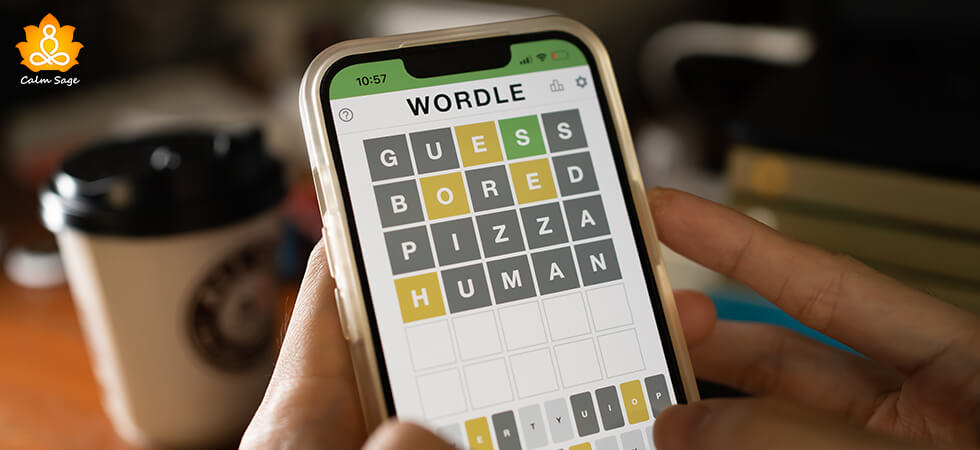News

“Wordle” has taken the world by storm. In the last few weeks, this web-based word puzzle has become the most popular and widely talked about word game in the world. This Wordle word puzzle gives 6 tries to the user to guess the 5-letter word.
Having gained immense popularity at the beginning of 2022, Wordle provides a combination of challenges and social connections.
Wordle not only challenges our brain and fosters social connection but experts say that playing the Wordle word puzzle can also give your mood a boost prompted by a sense of achievement. The little joys we get from achieving success, even in a game, can not only boost our mood but can be healthy for our mental health too.
Before we move forward, let’s take a look at what in the world is Wordle.
What Is “Wordle” Word Puzzle?

When you open the web-based puzzle, you’ll see the instructions on how to play the word game. You’ll need to guess the word of the day in 6 tries. Each guess must be a five-letter word. Once you’re done guessing, you’ll need to hit enter.
After each guess, the color of the tiles will change to show how close your guess was to the word. The tile will show green if the letter is in the correct spot. The tile will turn yellow if the letter is in the word but the placement is wrong. And if the tiles turn gray, then your guess is incorrect.
For the next blocks, you need to check your first attempt and make another guess. This word puzzle objective is to guess what the “wordle of the day” is before your tries run out.
This is my try at Wordle.

The best thing about Wordle is that you only get one chance a day, so once you’re done guessing you won’t exactly get to spend all of your time playing this game.
Play Wordle
Why Word Games Can Be Good For Our Brain Health?

Dr. Douglas Scharre, a neurologist at the Center for Cognitive and Memory Disorders at Ohio State University, believes that solving word puzzles or playing word games such as Wordle or Scrabble can be good for your cognitive health.
When you challenge your brain to solve a problem, as in a puzzle or a game, it can stimulate key parts of your brain – reasoning, logical thinking, visual awareness, attention, and other such functions.
According to Dr. Scharre, playing word games can help prevent your memory and cognitive health from declining. The more you challenge your brain, the healthier the functions will become.
Such word games and puzzles can also help build your cognitive skills if you’re struggling with head trauma, after-effects of a stroke, sleep apnea, other memory disorder, or any disorders that affect your thinking skills.
Word Games Can Build More Than Just Cognitive Skills
From the Department of Psychology at the University of Florida, Dr. Matt Baldwin says that if one looks beyond the many reasons why people are loving Wordle, you’ll realize that this word puzzle is also helping create more social connections.
You’re not the only one in the world playing Wordle, after all. When you do something with others together, the feelings you experience can magnify. So when you’re playing this word game with millions of people around the world, the experience, the feeling is magnified.
Let’s face it when you’re trying to solve a puzzle, aren’t you more likely to ask your friends, your family, your peers for help? Well, with Wordle taking Twitter and Instagram by storm, people are discovering the experience of sharing ideas along with the rest of the world.
As I mentioned above, you get to solve one wordle a day so what you’re looking for is what others are looking for as well. Whether you believe it or not, Wordle is a shared experience that’s slowly bringing others together and fostering social connections.
Dr. Baldwin also explains that for the past two years, we’re all living a shared experience – something that’s brought us together. Just like Wordle.
He further adds,
“Something about Wordle reminds us that there is still good out there and that we may be more similar than we are different. We may be starkly polarized on social issues and politics, but if we can all agree that Wordle is fun, maybe there is some hope.”
Another expert in the field of neuroscience at the University of Oregon says that playing word games can boost anyone with a low mood. Such activities are quite fun and engaging. They can take our minds away from mindless thinking and over worrying.
During times of pandemic, stress is the most common issue that we face almost every day. When we experience stress, the stress hormones can disrupt our entire system if we don’t release our stress. Playing word games like wordle can help reduce the threat of loneliness, anxiety, and even depression.
Of course, if you don’t have access to physical games or in-person social contact, online games like Wordle allow you to stay socially connected while working towards improving your mood, thinking skills, and productivity.
This brings me to my next point. When you reach that “Aha!” point, when you get that sense of achievement, dopamine – the feel-good hormone is released. And when you get to share the achievement with your friends, oxytocin-the love hormone is released. Both of these happy hormones can help calm our nerves and increase feelings of calm and relaxation.
If playing a word game such as Wordle can release my stress and give me a boost of dopamine and oxytocin, why wouldn’t I want to play?
Suggested Read 12 Best Ways To Increase Happy Hormones In Your Body
Writer’s Thoughts
If you don’t enjoy word games, no worries! Other activities can give you the same benefits as Wordle. Physical exercising or activities such as dancing, singing, learning musical instruments, solving puzzles, etc can all help you foster social connections, increase your dopamine levels, and boost your brain health.
The popularity of Wordle is unmatched for many reasons. If you haven’t tried this word puzzle yet, give it a try here! Let this simple word puzzle challenge and stimulate your brain when life becomes too overwhelming.
Take care!











